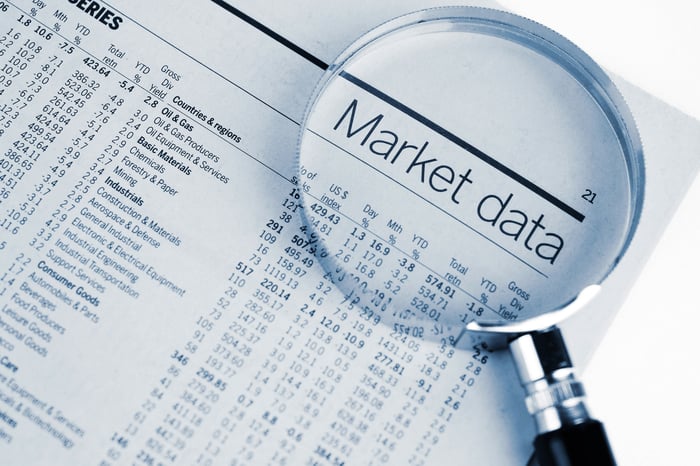Berkshire Hathaway (BRK.A 0.98%) (BRK.B 0.94%) CEO Warren Buffett is easily one of the greatest investors of our time. In 58 years since taking the reins, the Oracle of Omaha has led his company's Class A shares (BRK.A) to an aggregate gain of better than 4,100,000%, as of the closing bell on June 23, 2023. In simpler terms, he's doubled up the annualized performance of the broad-based S&P 500 over a nearly six-decade stretch (19.8% versus 9.9%).
What's particularly interesting about Warren Buffett's investing philosophy is that he's transparent about what he's looking for in businesses. Although the Oracle of Omaha's list of "investing rules" can fill a book, the key points include buying great businesses with well-defined moats and trusted management teams, and holding on to those investments for long periods. He's also a big fan of portfolio concentration -- i.e., putting a sizable percentage of invested assets into your best ideas.
It's a relatively simple investing strategy that anyone can follow. But not even Warren Buffett follows his own investing rules all the time.

Berkshire Hathaway CEO Warren Buffett. Image source: The Motley Fool.
Apple would appear to check all the right boxes for Warren Buffett
Despite Berkshire Hathaway holding stakes in approximately four dozen securities, nearly 47% of the company's $366 billion of invested assets is tied up in tech stock Apple (AAPL 0.53%). That's about 39 percentage points more than Bank of America, Berkshire's second-largest holding by market value.
Buffett's faith in Apple shouldn't come as a surprise. During Berkshire Hathaway's annual shareholder meeting, the Oracle of Omaha was quoted as saying that Apple is "a better business than any we own" when justifying why it represents such an outsized percentage of invested assets. Portfolio concentration has always been a successful strategy for Warren Buffett.
Apple also checks a number of important boxes that Warren Buffett looks for in an investment, including brand-name/consumer appeal, trustworthy management, and, in many cases, a top-notch capital-return program.
Earlier this month, Kantar BrandZ's Most Valuable Global Brands Report labeled Apple its most-valuable brand for a second consecutive year. Meanwhile, Interbrand has had Apple at the top of its global brand rankings for 10 straight years (as of 2022). The Oracle of Omaha appreciates businesses that consumers trust.
Apple CEO Tim Cook has also given Berkshire Hathaway's leadership plenty of reason to smile. Cook has allowed innovation to do the vast majority of the talking. Apple has been the runaway leader in U.S. smartphone market share since 5G-capable iPhones hit showrooms in the fourth quarter of 2020. Further, the company's higher-margin subscription services segment has been growing at a notably faster pace than its physical products.
As for Apple's capital-return program, it's essentially unmatched among publicly traded companies. It's doling out more than $15 billion a year in nominal-dollar dividends and has repurchased $586 billion worth of its common stock over the past 10 years. An easy way to get on Warren Buffett's good side is to increase Berkshire Hathaway's stake in your businesses via buybacks.
However, not every aspect of Buffett's ongoing investments in Apple jibes with his investing rules.

Image source: Getty Images.
Apple is a wonderful company at anything but a fair price
Among the long list of "Buffett-isms" I've not yet mentioned is his affinity for getting a good deal on what he's buying. In Warren Buffett's exact words, "It's far better to buy a wonderful company at a fair price than a fair company at a wonderful price."
When the Oracle of Omaha and his investing lieutenants, Ted Weschler and Todd Combs, first began purchasing shares of Apple for Berkshire Hathaway's investment portfolio in the first quarter of 2016, they were, indeed, buying a wonderful company at a fair price.
Apple had closed out 2015 with a trailing-12-month (TTM) price-to-earnings (P/E) ratio of less than 14, was trading at below 10 times year-end cash flow, and offered a forward-year P/E ratio of a little over 10 for fiscal 2016 (Apple's fiscal year ends in late September). For a company that had revolutionized the smartphone industry and was averaging double-digit annual sales growth, this was a phenomenal price to pay.
However, Warren Buffett and his team are still adding to Berkshire Hathaway's Apple position in spite of the fact that Apple is trading at anything but a "fair price." Berkshire purchased around 20.4 million shares of Apple stock in the first quarter of 2023, which comes atop the just over 8 million shares Buffett, Combs, and/or Weschler picked up throughout 2022.
AAPL PE Ratio data by YCharts.
Investors today are paying over 31 times TTM earnings and roughly 27 times cash flow to own shares of Apple. Looking ahead doesn't demonstrably improve things, either, with Apple priced at more than 28 times Wall Street's consensus earnings for fiscal 2024. Except for 2020-2021, when corporate earnings and cash flow were abnormally low due to pandemic-related uncertainties, Apple hasn't been this pricey since the financial crisis of 2008.
What makes Apple's lofty valuation even more egregious is that the company isn't even growing. Despite having above-average inflation as a tailwind, the expectation is that it'll see sales and profits each decline by roughly 2% to 3% in fiscal 2023. In real-dollar terms, we're talking about Apple's revenue tapering off by the high single digits this year -- yet shares are trading at an all-time high.
Although Apple controls roughly half of U.S. smartphone market share, the decision not to ramp up production of iPhone 14 last September indicates that consumers were very likely unimpressed with the changes/improvements made to the model, compared to the previous year. With such a lofty premium to earnings and cash flow, Apple probably needs to blow away consumer and analyst expectations in the quarters to come with its next-generation iPhone if it has any hope of sustaining this valuation.
There's no question that Apple is a wonderful company. However, the "fair price" argument left the building some time ago.






